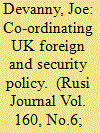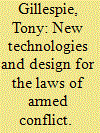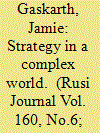| Srl | Item |
| 1 |
ID:
142307


|
|
|
|
|
| Summary/Abstract |
How should the agenda set by the Strategic Defence and Security Review be implemented? The traditional answer would be committed leadership and strong investment. Design theory, however, offers a different perspective on UK strategy which is focused more on institutional capacity for action and the identification of long-term goals than on the prime minister's decision-making. Mikkel Vedby Rasmussen argues that strong strategies are based on a cogent response and a coherent narrative that enables the UK government to achieve full-spectrum effect. Such an effort should especially focus on using the capabilities of allies.
|
|
|
|
|
|
|
|
|
|
|
|
|
|
|
|
| 2 |
ID:
142306


|
|
|
|
|
| Summary/Abstract |
Since 2010 the National Security Council (NSC) has won plaudits for improving the clarity and regularity of national-security co-ordination. It has also been criticised for strategic shortcomings and a lack of capacity to drive forward the implementation of its decisions across government. Joe Devanny appraises the NSC's performance and future prospects, although without access to NSC proceedings it is difficult to infer the quality of its decisions or the coherence of its policies from the ambiguous evidence of apparent policy outcomes or public statements. So closely is the NSC associated with Prime Minister David Cameron that his expected retirement by 2020 renders its future uncertain.
|
|
|
|
|
|
|
|
|
|
|
|
|
|
|
|
| 3 |
ID:
142311


|
|
|
|
|
| Summary/Abstract |
Trevor Paglen, whose work The Octopus was recently shortlisted for the Deutsche Börse Photography Foundation Prize 2016, is a multidisciplinary artist who focuses on surveillance and intelligence activities – what he terms the ‘invisible war’. As well as his solo work, he collaborated with Laura Poitras in the making of Citizenfour, the award-winning 2014 documentary film about Edward Snowden. Other recent projects include Code Names of the Surveillance State, a video installation in which National Security Agency and GCHQ surveillance-programme code names were projected onto public buildings, and Trinity Cube in the Fukushima Exclusion Zone. In this interview, he reflects on some of the questions with which he grapples in his work, from the nature of contemporary warfare to the tension between privacy and surveillance, and the role of the artist in understanding war in contemporary society.
|
|
|
|
|
|
|
|
|
|
|
|
|
|
|
|
| 4 |
ID:
142309


|
|
|
|
|
| Summary/Abstract |
In May 2015, the Italian Ministry of Defence published its White Paper for International Security and Defence. In this article, Andrea Gilli, Alessandro R Ungaro and Alessandro Marrone examine the important domestic changes outlined in the document, including those made to the policy-making processes and the internal discussion about strategic issues. The document restricts Italy's focus to the Euro-Mediterranean region but sees a more active role for its armed forces - if and when necessary. European co-operation is also prioritised, especially with regards to military technology and procurement. It also puts forward reform of the defence ministry aimed at shaping an integrated approach and promotes further jointness, starting from the strengthening of the Joint Operational Command that will take responsibility for any future military operation.
|
|
|
|
|
|
|
|
|
|
|
|
|
|
|
|
| 5 |
ID:
142310


|
|
|
|
|
| Summary/Abstract |
Military systems exploiting new technologies must meet the requirements of International Humanitarian Law (IHL), but advanced processing and networks raise problems for legal reviews. Tony Gillespie examines the engineering solutions to these challenges, especially the problems of increased system complexity and increased autonomy. He concludes that full compliance with IHL can be achieved as part of a properly planned procurement process, even for radically new technologies. This requires cross-disciplinary collaboration from the earliest concept and design stages.
|
|
|
|
|
|
|
|
|
|
|
|
|
|
|
|
| 6 |
ID:
142308


|
|
|
|
|
| Summary/Abstract |
The new US maritime strategy has received praise from many corners of the world. As a manual it is well suited to guide the efforts of its three sea services in navigating a challenging global security environment in the years ahead. The strategy emphasises maritime presence, both where conflict threatens the global system and US national interests, and where allies require reassurance, particularly in the Indo-Pacific region. However, Stefan Lundqvist and J J Widen argue that the document fails, to some extent, to address Russia's increasingly challenging conduct and its implications for Northeast Europe and the Baltic Sea region.
|
|
|
|
|
|
|
|
|
|
|
|
|
|
|
|
| 7 |
ID:
142304


|
|
|
|
|
| Summary/Abstract |
Although it is commonplace to describe today's security environment as ‘complex’, there are still pockets of coherence around which policy-makers can anchor their strategy. Jamie Gaskarth argues that attempts to mirror the supposedly disorderly global security world with a disorderly strategy have led only to confusion, inefficiency and declining public support. Instead, the government needs to grapple with British identity and link this to a coherent narrative about how and why it wants to act in the future.
|
|
|
|
|
|
|
|
|
|
|
|
|
|
|
|
| 8 |
ID:
142305


|
|
|
|
|
| Summary/Abstract |
With the rise of new centres of power, the environment in which British decision-makers attempt to create an effective foreign and defence strategy is undergoing a profound change. Benjamin Zala argues for a three-pronged response. First, finding a way of building a national strategy for a world in which new powers are rising in different ways and at different rates that avoids the conceptual dead ends of a ‘networked' and ‘nonpolar' world. Second, revisiting the debate over the costs and benefits of the US alliance in light of the potential return of major-power alliances for the first time since the Second World War. Third, pursuing a British approach to multilateralism and global-governance reform that reflects the decreasing dominance ofthe West.
|
|
|
|
|
|
|
|
|
|
|
|
|
|
|
|